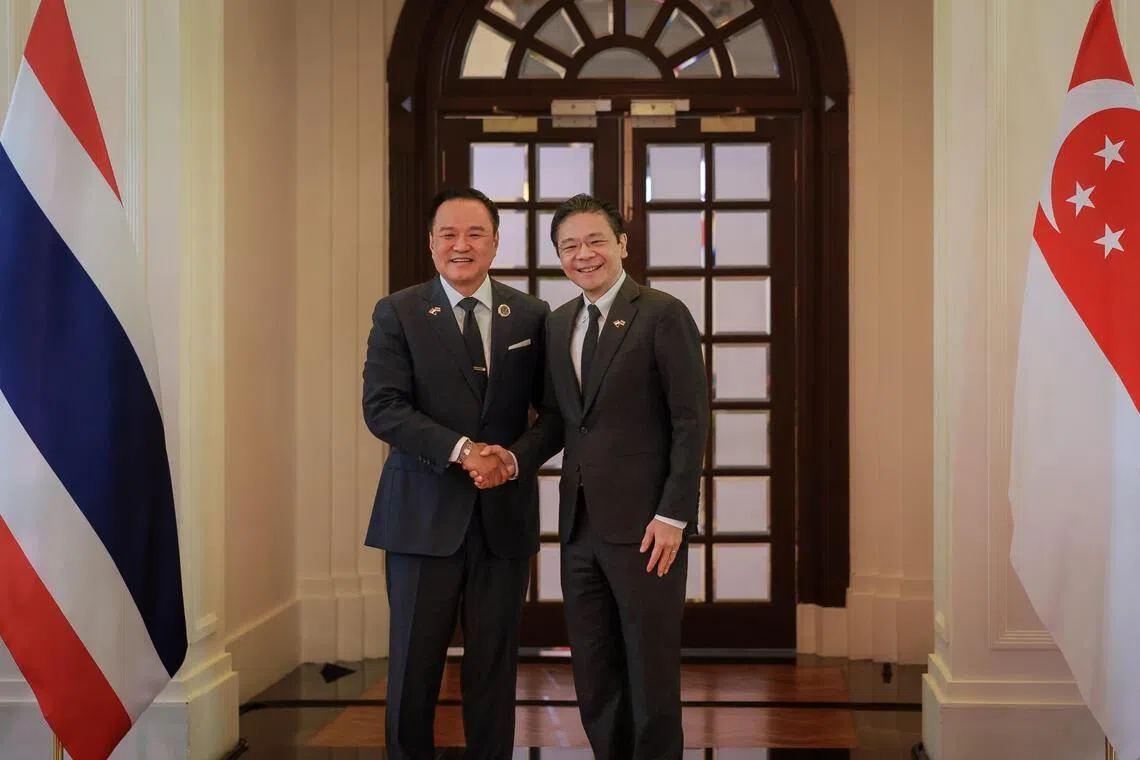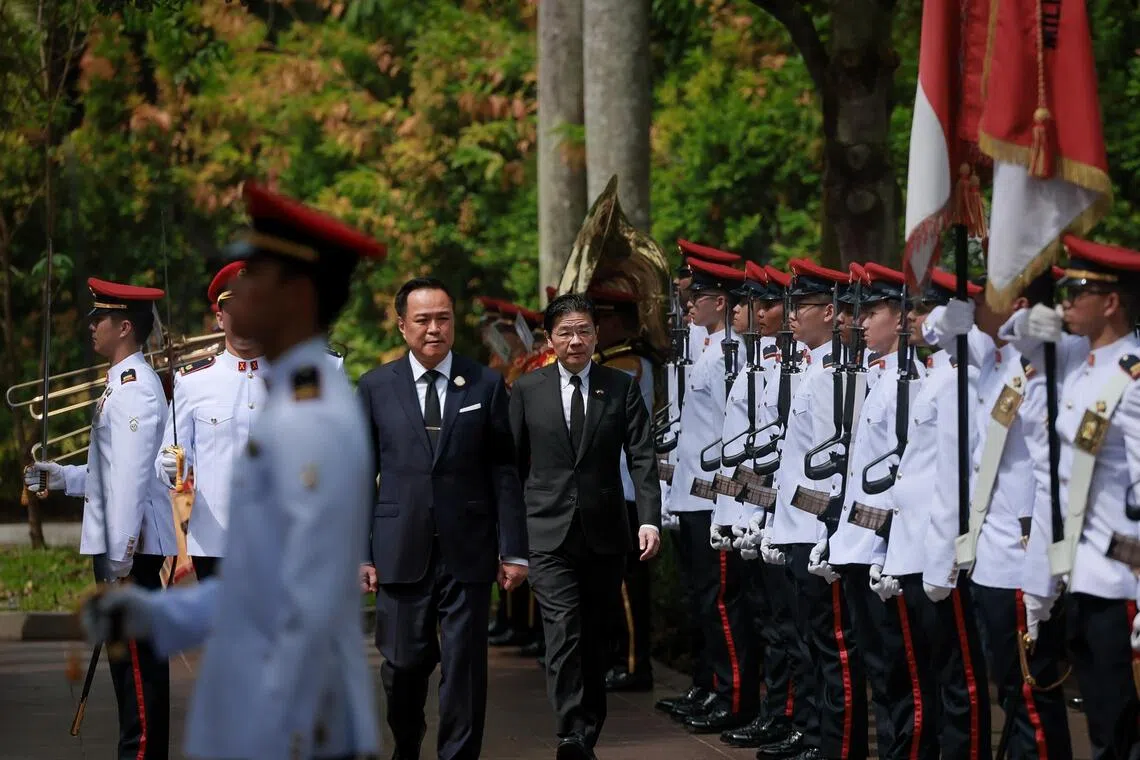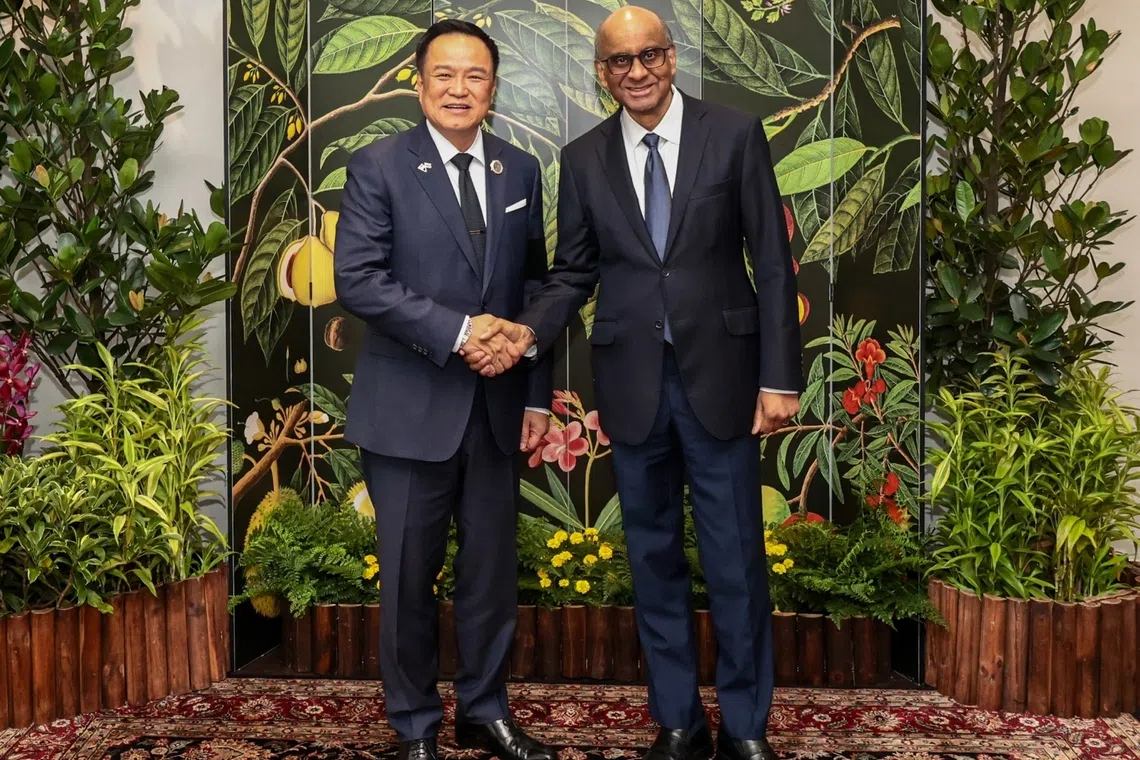Singapore, Thailand ink deals in rice trade, healthcare
Sign up now: Get ST's newsletters delivered to your inbox

Prime Minister Lawrence Wong (right) and Thai Prime Minister Anutin Charnvirakul during a joint media conference at the Ministry of Foreign Affairs on Nov 7.
ST PHOTO: GAVIN FOO
Follow topic:
- Singapore and Thailand signed MOUs to expand rice trade and deepen healthcare cooperation for ageing populations, marking 60 years of bilateral ties.
- Both countries will collaborate on healthy ageing, carbon credits, fighting cybercrime, and to deepen digital economy cooperation in Asean.
- PM Wong and PM Anutin agreed to strengthen ties beyond government projects, highlighting people-to-people bonds through tourism, the arts, and sports like Muay Thai.
AI generated
SINGAPORE - Singapore and Thailand have signed pacts to expand the sale of rice to the Republic, and to deepen cooperation in healthcare capabilities to meet the needs of their ageing societies.
The two memorandums of understanding (MOUs) were signed on Nov 7 during Thai Prime Minister Anutin Charnvirakul’s first official visit to Singapore since taking office in September 2025. This is also Mr Anutin’s first official overseas visit as prime minister.
The agreements are the latest in a raft of deals that the two close neighbours have made in 2025, which is the 60th anniversary of bilateral relations.
At a joint press conference after the signing of the MOUs, Prime Minister Lawrence Wong noted that the two countries had, over 60 years, forged deep ties built on trust, respect and friendship.
Bilateral relations are in excellent shape, economic links are robust, defence cooperation has been longstanding and ties between the two peoples are equally strong, he added.
While relations are already mature and multi-faceted, there remains tremendous potential for both sides to do even more together, said PM Wong.
For instance, said the Ministry of Sustainability and the Environment in a statement, the rice agreement will strengthen assurance of the mutually beneficial trade in rice by avoiding unnecessary restrictive measures.
PM Wong said: “We discussed this morning that we can go even further, expand our food cooperation beyond rice, and (we) look forward to more opportunities for both sides.”
This is the latest in the Republic’s bilateral food security agreements, following a similar pact with Vietnam
Singapore and Thailand will also work together in the areas of geriatrics and geriatrics rehabilitation services, following an agreement signed between SingHealth and the Thai Department of Medical Services.
The collaboration will be led by Changi General Hospital, which has an established geriatric medicine department, and will build the capabilities of Thai healthcare leaders in areas such as governance and policy implementation strategies, said Singapore’s Ministry of Health.
Mr Anutin said at the press conference that his visit was both meaningful and timely, and that the two countries are deepening their cooperation across many fields.
On the green economy, he noted that Singapore and Thailand’s implementation agreement on carbon credits that was signed in August was the city-state’s first with any Asean country. Thailand also reaffirms its support for the second phase of the Lao-Thailand-Malaysia-Singapore Power Integration Project and for ways to enhance renewable energy cooperation, he added.
The Thai Prime Minister also noted that both countries have a shared concern in fighting scams and cybercrime, and had in May signed a pact to intensify cooperation to tackle these scourges.
Singapore has also been Thailand’s top foreign investor for the last two years, and Mr Anutin said he welcomed more investments in high-tech industries such as semiconductors, electric vehicles, biotech and data centres.
Both leaders also pledged to work together on digital cooperation, both bilaterally and in broader settings.
PM Wong noted that Thailand, as chair of the Asean Digital Economy Framework Agreement (Defa), has been instrumental in steering the agreement to substantial cooperation.
Touted as the first major regionwide digital economy agreement in the world, the grouping is expected to sign the pact in 2026
Mr Anutin said Thailand wants to unlock the full potential of digital integration and innovation through Defa. The kingdom is also keen to join the Digital Economy Partnership Agreement (Depa), another digital trade agreement founded by Singapore, New Zealand and Chile.
“We recognise Asia as the centre of world economic gravity, (and) we aim to advance regional economic integration and unlock the potential of over 600 million people in Asean,” he said.

Prime Minister Lawrence Wong (right) and Thai Prime Minister Anutin Charnvirakul during a welcome ceremony at the Ministry of Foreign Affairs on Nov 7.
ST PHOTO: GAVIN FOO
In his remarks, PM Wong also expressed Singapore’s condolences on the passing of Thailand’s Queen Mother Sirikit,
“Her Majesty’s lifelong dedication to the Thai people will be fondly remembered both in Thailand and across the world,” he said.
On the trip, Mr Anutin called on President Tharman Shanmugaratnam and also visited the National Orchid Garden, where a new orchid hybrid was named in his honour.

President Tharman Shanmugaratnam (right) and Prime Minister Anutin Charnvirakul at the Istana on Nov 7.
PHOTO: MDDI
At an official lunch hosted in Mr Anutin’s honour, PM Wong noted that the Thai PM’s visit capped off a series of high-level exchanges in a milestone year for the two countries.
Thai Foreign Minister Sihasak Phuangketkeow made his introductory visit to Singapore in October for the 15th edition of the Singapore-Thailand Civil Service Exchange Programme, while Thai Princess Maha Chakri Sirindhorn visited twice – in January and August – to engage healthcare, educational and cultural institutions here.
These frequent exchanges reflect and reinforce the trust between the two sides, which has been the foundation of the strong and wide-ranging cooperation, said PM Wong.
But he added that the relationship is not just about projects between governments, but is also built on the strong and enduring friendship between its people.
Thailand continues to be a popular destination for Singaporeans, as well as a rich source of inspiration for arts practitioners in Singapore, noted PM Wong. More Singaporeans are also taking an interest in muay thai, and in May the city-state hosted its first-ever World Professional Muay Thai Federation title fight.
“These bonds between our people are at the heart of our friendship – and they are the reason why the Singapore-Thailand relationship remains so warm, so close, and so full of promise for the future,” he said.


